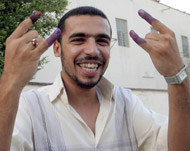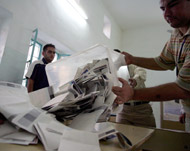Iraq charter: Polling stations close
Iraqi voting stations have closed following a referendum on a constitution that would lay the foundations for a post-Saddam Hussein political era.

A total of 15.5 million voters were registered to vote on the charter, which is expected to establish a democratic framework for a new Iraq; but has sharply divided the country on ethnic lines and was only drafted after weeks of tortuous negotiations.
More than 61% of Iraqis, who were registered to vote in Saturday’s constitutional referendum, cast their ballots according to a preliminary estimation, independent electoral commission member Abdel Hindawi said.
Some voters praised the referendum as a godsend of freedom after decades of dictatorship in Iraq. Others called it the work of evil foreign occupiers.
No matter how Iraqis reacted to the draft constitution as they voted, the document touched off a furious debate about issues as central to democracy as religion and state, national identity and women’s rights.
Debate
“This is not democracy,” Youssef Ibrahim al-Shimiri, 76, a retired male nurse said after voting “no” in a mostly Sunni Arab area of Baghdad.
|
“There can be no democracy if it arrives on tanks, and children and women are killed every day” Youssef Ibrahim al-Shimiri, |
“There can be no democracy if it arrives on tanks, and children and women are killed every day,” he said, referring to the US-led invasion of Iraq in 2003.
“How can this constitution fail to clearly state Iraq‘s Arab identity? Iraq is Arab, and there should not be a shred of doubt about that.”
In the northern city of Kirkuk, a Sunni woman emerging from a polling station said she had voted “no” because of her Muslim religion and her pride in Iraq.
“It is against Islam. It’s a Western constitution,” she said. “Therefore it is said to be forbidden.”
Fragmenting Iraq
Many Sunni Arabs reject the charter, believing it will fragment Iraq, tear it away from the Arab world and hand power to the Shia majority – and they feel the United States is ultimately behind the document, which was drawn up in long negotiations between Iraq‘s factions.
|
“I believe this constitution could improve our situation, maybe even allow more women to be elected to the National Assembly” |
Shia, meanwhile, mainly support the document, largely because it gives them considerable self-rule powers in the south.
But that was not why Muna Ali supported it. The 24-year-old Shia said her reason was that the document could improve women’s rights in this male-dominated country.
“I believe this constitution could improve our situation, maybe even allow more women to be elected to the National Assembly,” she said in Baquba, 60km northeast of Baghdad.
Constitution praised
Nearby, fellow Shia Hussein Ali, 85, praised the constitution for making it impossible for future Iraqi governments to suppress the country’s Shia majority as Saddam Hussein and his Sunni cronies did for decades.
“I will say “yes” because I suffered and I was oppressed during the former regime,” Ali said before entering one of the many school polling stations in Iraq that were protected by security forces and cement walls. “I can now vote freely,” he said with pride.
Many Iraqis emerging from the polling centres indicated that they had not even read the draft constitution that was distributed across Iraq.
Others said that even if they had, they would simply vote the way their religious or political parties had told them to.
 |
|
Many voters voted the way their |
But some Iraqis saw the referendum as a chance to go their own way.
In Sadr City, a mostly Shia area of Baghdad controlled by Shia cleric Muqtada al-Sadr, who led uprisings against the US-led coalition in 2004, people were widely expected to vote “yes.” But not Haitham Aouda Abdul-Nabi, a 23-year-old co-owner of a convenience store.
When he showed up at a secondary school to vote in Sadr City, a poor area that is home to an estimated 2.5 million Shia, he said: “More than 90% of Iraq‘s Shia support the constitution, but not me.”
Tired of chaos
Why? Because he is tired of all the chaos in Iraq since the fall of Saddam: killings by the Sunni-led fighters, fighting between them and US forces, squabbling in Iraq’s mostly Shia and Kurdish government, and nearly daily power outages in the capital.
“Only force can bring results with a people like us in Iraq,” he said. “Unfortunately, we need someone like Saddam. This government is too weak.”
 |
|
Some people believe only force |
Whatever stand voters took in their debate over the constitution and Iraq‘s future, the intensity of the discussion on such complex issues even drew the attention of one teenager.
In Mahmoudiya, a mostly Sunni town 30km south of Baghdad – an area known as the Triangle of Death because of its violence – 14-year-old Shia Ali Hussein tried without success several times to enter a polling station and vote.
“They won’t let me in because I’m too young,” he said outside the school, where he had been waiting for several hours. “But I want to say “yes” to the constitution.”